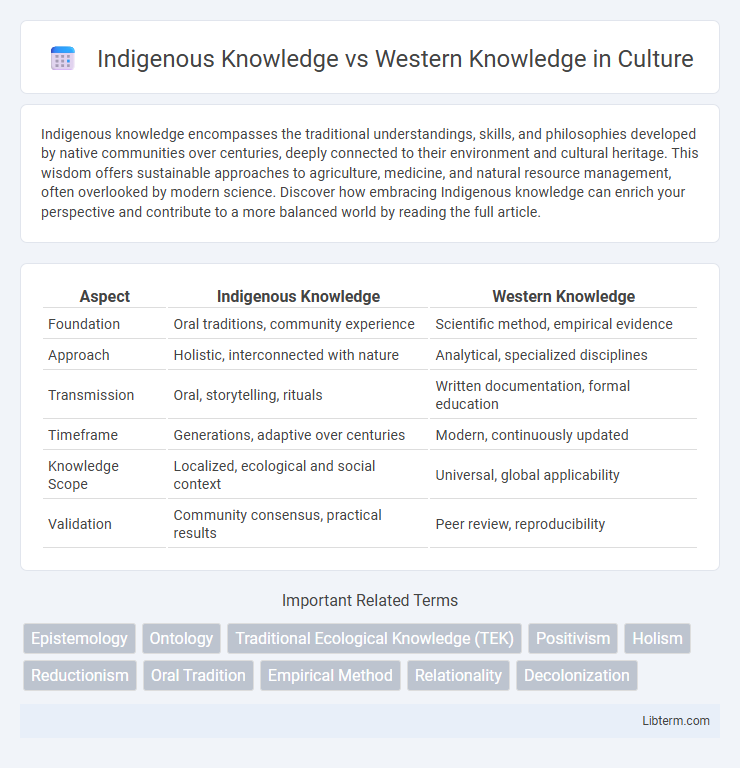Indigenous knowledge encompasses the traditional understandings, skills, and philosophies developed by native communities over centuries, deeply connected to their environment and cultural heritage. This wisdom offers sustainable approaches to agriculture, medicine, and natural resource management, often overlooked by modern science. Discover how embracing Indigenous knowledge can enrich your perspective and contribute to a more balanced world by reading the full article.
Table of Comparison
| Aspect | Indigenous Knowledge | Western Knowledge |
|---|---|---|
| Foundation | Oral traditions, community experience | Scientific method, empirical evidence |
| Approach | Holistic, interconnected with nature | Analytical, specialized disciplines |
| Transmission | Oral, storytelling, rituals | Written documentation, formal education |
| Timeframe | Generations, adaptive over centuries | Modern, continuously updated |
| Knowledge Scope | Localized, ecological and social context | Universal, global applicability |
| Validation | Community consensus, practical results | Peer review, reproducibility |
Understanding Indigenous Knowledge Systems
Indigenous knowledge systems encompass holistic, place-based understandings developed over millennia, integrating ecological, cultural, and spiritual dimensions. These systems prioritize intergenerational learning, oral traditions, and community stewardship, contrasting with Western knowledge's emphasis on empirical data and reductionist methodologies. Recognizing the validity and complexity of Indigenous knowledge enhances sustainable resource management and fosters collaborative cross-cultural research approaches.
Core Principles of Western Knowledge
Western knowledge centers on empirical evidence, critical thinking, and systematic inquiry, emphasizing objectivity and replicability in the pursuit of understanding. It relies heavily on scientific methods, quantification, and reductionism to analyze phenomena. Core principles include skepticism, hypothesis testing, and the separation of subject and object to generate universal laws and theories.
Epistemological Differences: Ways of Knowing
Indigenous knowledge emphasizes holistic, experiential, and relational ways of knowing rooted in cultural traditions, oral histories, and spiritual connections to the environment. Western knowledge predominantly relies on empirical evidence, analytical reasoning, and scientific methodologies that prioritize objectivity and reproducibility. These epistemological differences highlight contrasting approaches to truth, validation, and the integration of knowledge within social and ecological contexts.
Relationship with Nature: Holistic vs. Analytical Approaches
Indigenous knowledge emphasizes a holistic relationship with nature, viewing humans as interconnected with ecosystems and recognizing the importance of balance and sustainability. Western knowledge often employs an analytical approach, breaking down natural systems into discrete components for study and manipulation. This contrast shapes differing environmental practices, with Indigenous methods fostering long-term ecological harmony and Western approaches frequently prioritizing control and resource extraction.
Transmission of Knowledge: Oral Traditions vs. Written Records
Indigenous knowledge is primarily transmitted through oral traditions, including storytelling, songs, and ceremonies, which preserve cultural values and environmental understanding across generations. Western knowledge typically relies on written records, such as books, journals, and digital archives, facilitating detailed documentation and widespread dissemination. Oral transmission emphasizes relational and contextual learning, while written records prioritize systematic organization and standardized information storage.
Spirituality and Worldview in Knowledge Formation
Indigenous knowledge emphasizes a holistic worldview deeply rooted in spirituality, where knowledge is interconnected with the land, ancestors, and community practices. Western knowledge often prioritizes empirical evidence and objectivity, separating spirituality from scientific inquiry. The integration of spirituality in Indigenous knowledge systems fosters a relational understanding of the world, contrasting with the compartmentalized approach characteristic of Western epistemology.
Scientific Validation and Empiricism
Indigenous knowledge systems prioritize experiential learning, oral traditions, and holistic understanding of ecosystems, emphasizing long-term observation and community validation. Western knowledge relies heavily on scientific validation, controlled experimentation, and empirical data to establish reproducible and measurable evidence. Both knowledge systems contribute uniquely to understanding natural phenomena, with Indigenous knowledge offering contextual insights that complement empirical Western methodologies.
Indigenous Knowledge in Sustainable Development
Indigenous Knowledge plays a crucial role in sustainable development by offering deep-rooted practices that enhance environmental stewardship and biodiversity conservation. These traditional systems embody holistic approaches to resource management, fisheries, agriculture, and forest preservation that are adapted to local ecological conditions over centuries. Incorporating Indigenous Knowledge into formal sustainability frameworks strengthens resilience against climate change and supports community-based natural resource governance.
Challenges of Integrating Both Knowledge Systems
Integrating Indigenous Knowledge and Western Knowledge faces challenges such as differing epistemologies, where Indigenous Knowledge emphasizes relational, holistic understanding tied to land and community, while Western Knowledge often prioritizes empirical, reductionist approaches. Power imbalances and institutional biases can marginalize Indigenous perspectives, complicating equitable collaboration in resource management, environmental conservation, and education. Bridging these knowledge systems requires respectful dialogue, recognition of Indigenous sovereignty, and adaptive frameworks that honor both cultural integrity and scientific rigor.
Towards Mutual Respect and Knowledge Coexistence
Indigenous knowledge, rooted in generations of lived experience and close relationship with the environment, offers holistic insights that complement Western scientific methods focused on empirical data and experimentation. Embracing knowledge coexistence fosters mutual respect by valuing the unique contributions of both systems, promoting collaborative approaches to challenges in sustainability, health, and cultural preservation. Recognizing Indigenous epistemologies alongside Western frameworks encourages inclusive policies and equitable partnerships that enrich global understanding and innovation.
Indigenous Knowledge Infographic

 libterm.com
libterm.com